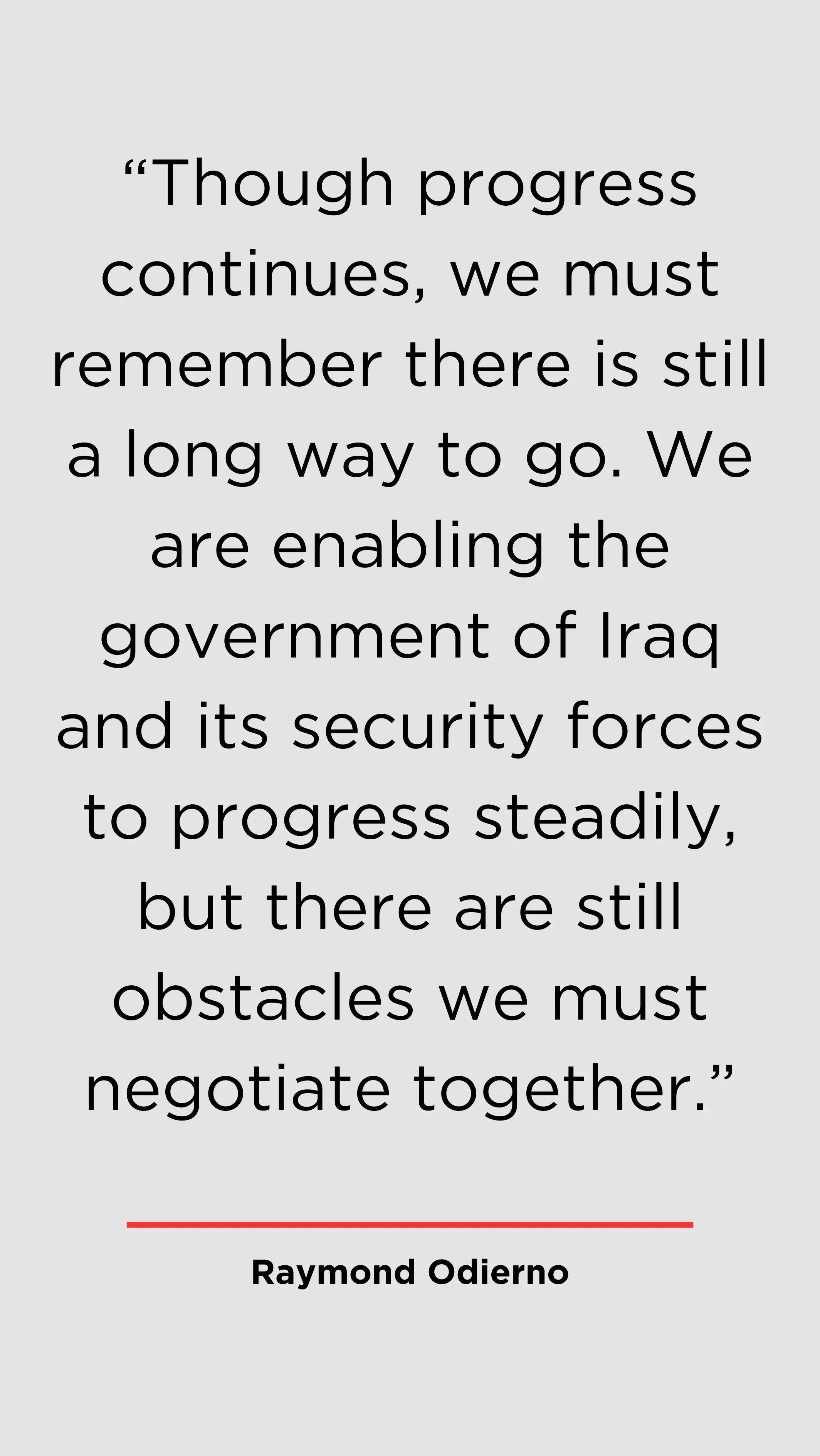Raymond Odierno, a distinguished U.S. Army officer, is renowned for leading Multinational Force Iraq during a crucial Iraq War phase. Born on September 8, 1954, in Rockaway, New Jersey, Odierno’s life and military career were marked by his dedication to service and his leadership in some of the most challenging and transformative periods in American military history.
Early Life and Military Service
Raymond Odierno’s early life reflected a strong sense of duty and a commitment to uphold his family’s military tradition. His journey to a distinguished military career began at West Point, where he underwent rigorous education and training. In 1976, he was commissioned as a second lieutenant in the U.S. Army, a significant moment that set the stage for his lifelong commitment to serving his country.
Odierno’s military service, initiated during his formative years, would become a defining aspect of his life and identity. West Point and officer commissioning laid the foundation for a distinguished military career marked by leadership, dedication, and duty. Odierno’s unwavering commitment to core values and troop welfare made him a respected and influential figure in the Army.
Raymond Odierno: Specializing in Armor and Cavalry
Raymond Odierno’s military career was distinguished by his specialization in armor and cavalry, domains of expertise that played a crucial role in his rise through the ranks. His commitment to honing his skills and knowledge in these areas led him to undergo training in several prestigious military institutions. Odierno completed the Armor Officer Basic Course, which provided him with a solid foundation in armored warfare tactics and leadership. This early training instilled in him the essential skills and understanding required for effective command within the armor and cavalry branches.
In addition to his initial training, Odierno furthered his military education by attending the U.S. Army Command and General Staff College. Here, he expanded his strategic and tactical thinking, enabling him to assume positions of greater responsibility and leadership within the U.S. Army. His specialized knowledge in armor and cavalry, combined with advanced military education, positioned him as a seasoned and capable officer, setting the stage for his future accomplishments and service to the nation. Raymond Odierno’s dedication to these military disciplines contributed significantly to his career and the impact he would later have on the U.S. Army.
The Gulf War and Rising Through the Ranks
Raymond Odierno’s military career witnessed a significant turning point during the Gulf War in 1991. Serving as a division operations officer and later as the executive officer of an armored brigade, Odierno’s leadership and strategic acumen shone through. His dedication and remarkable performance in this conflict showcased his ability to navigate complex military operations, a quality that would become a defining aspect of his career.
Odierno’s role in the Gulf War not only demonstrated his military prowess but also played a pivotal role in his ascent through the ranks of the U.S. Army. His leadership capabilities and strategic thinking distinguished him among his peers and superiors, leading to a series of increasingly significant assignments and promotions. His experience during this conflict set the stage for a future marked by greater responsibility and influence within the U.S. Army, ultimately shaping his legacy as a highly regarded and accomplished military leader.
Raymond Odierno: Iraq War
During the early years of the Iraq War, Raymond Odierno held pivotal command positions, serving as the commanding officer of both the 4th Infantry Division and the 1st Armored Division. In these key roles, Odierno played a central and influential part in military operations aimed at stabilizing Iraq in the wake of Saddam Hussein’s regime’s fall. His leadership and strategic insight were instrumental in overseeing the complex and challenging mission of transitioning Iraq to a more stable and secure state.
Odierno’s accomplishments during the Iraq War cemented his reputation as a seasoned military leader. His role in these critical operations underscored his commitment to the welfare of his troops and his determination to contribute to the mission’s success. His leadership was instrumental in helping to shape the U.S. military’s efforts in Iraq during an unruly and significant period in the nation’s history.
Commanding General of Multinational Force Iraq
Raymond Odierno’s most significant and challenging role came when he was appointed as the Commanding General of Multinational Force Iraq in 2008. This appointment thrust him into a position of enormous responsibility and leadership during a pivotal phase in the Iraq War. During his tenure, Odierno was tasked with overseeing the implementation of the U.S. military surge in Iraq, which involved a substantial increase in American forces and a shift in strategy aimed at quelling the insurgency and stabilizing the country. His leadership and strategic acumen played a crucial role in managing this complex and high-stakes mission.
As the Commanding General of Multinational Force Iraq, Odierno faced the daunting challenge of guiding military operations during a period marked by significant political and security challenges. His leadership, together with the efforts of his troops, played a central role in reducing violence and improving security conditions in Iraq. His command was instrumental in paving the way for the eventual drawdown of U.S. forces and a transition to a more stable Iraq.
Raymond Odierno: Counterinsurgency and Stabilization
Raymond Odierno’s leadership as the Commanding General of Multinational Force Iraq was characterized by a concerted focus on counterinsurgency strategy and stabilization efforts. Recognizing the importance of winning the support and trust of the Iraqi population, he implemented a multifaceted approach to address the insurgency and restore security. Under his guidance, U.S. forces sought to establish strong connections with local communities, fostering cooperation and collaboration in the effort to improve the security and living conditions in Iraq.
Odierno’s emphasis on counterinsurgency and stabilization was instrumental in reducing violence and fostering a more secure environment. By prioritizing the protection of the Iraqi people and engaging in strategic partnerships with local leaders, his leadership played a significant role in turning the tide of the conflict and laying the foundation for a more stable and secure Iraq. His commitment to these principles was integral to the success of the surge strategy and was emblematic of his dedication to the welfare of the nation and its allies. Raymond Odierno’s role in executing this strategy further solidified his reputation as a strategic military thinker and an influential figure in the Iraq War.
Withdrawal of U.S. Troops
One of Raymond Odierno’s most notable achievements during his command of Multinational Force Iraq was overseeing the withdrawal of U.S. combat troops from Iraq in 2010. This milestone represented a pivotal moment in the U.S. military presence in the country, symbolizing the end of a protracted conflict and the gradual transition to a post-war era. Under his leadership, the military executed a carefully planned withdrawal that aimed to fulfill the mission’s objectives while ensuring the safety and well-being of both American and Iraqi personnel.
Odierno’s role in the withdrawal process was emblematic of his commitment to fulfilling the mission and adhering to strategic goals. The successful withdrawal of combat troops marked the closing chapter of a complex and multifaceted mission and reflected his dedication to bringing stability to Iraq and honoring the sacrifices of those who had served in the conflict.
Raymond Odierno: Later Career and Retirement
Raymond Odierno’s illustrious military career did not conclude with his service in Iraq. In the years that followed, he continued to rise through the ranks, eventually becoming the 38th Chief of Staff of the Army, one of the most senior positions in the U.S. military hierarchy. In this role, he assumed responsibility for the overall readiness, training, and equipping of the U.S. Army, playing a critical role in shaping the future of the force.
Odierno’s tenure as Chief of Staff of the Army marked a period of significant leadership and transformation within the U.S. military. His dedication to the welfare of soldiers, combined with his strategic vision and experience, contributed to shaping the modernization and adaptation of the Army to meet the evolving challenges of the 21st century. After retiring from active duty in 2015, Odierno continued to exert influence in the realm of military policy and leadership. He maintained his role as an influential figure within the U.S. military and provided valuable insights into the complexities of national security and defense. His distinguished career serves as a testament to the impact of exceptional leadership and service to the nation.

Legacy and Impact
Raymond T. Odierno played a pivotal role in the Iraq War, providing steadfast leadership during one of the conflict’s most challenging and transformative periods—an enduring hallmark of his legacy. As the Commanding General of Multinational Force Iraq, he played a central role in the successful execution of the surge strategy, emphasizing counterinsurgency and stabilization. His commitment to protecting the Iraqi population, building essential relationships with local communities, and implementing a nuanced approach to military operations significantly contributed to reducing violence and improving security conditions in Iraq.
Odierno’s influence extended to the U.S. Army’s evolving doctrine in counterinsurgency and stabilization operations. His dedication to these principles and his leadership in implementing them in Iraq had a lasting impact on military strategy and shaped the way in which the U.S. military approached complex and irregular conflicts. His legacy stands as a testament to the value of strategic thinking, adaptability, and leadership in times of conflict, emphasizing the importance of military leaders who commit to the welfare of both their troops and the communities they serve. Raymond T. Odierno’s contributions continue to be studied and respected within the military community, affirming his enduring legacy as a distinguished leader and strategist.











